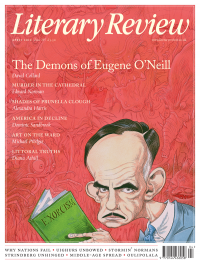Diana Athill
The Wave Cry, the Wind Cry
Sightlines
By Kathleen Jamie
Sort Of Books 242pp £8.99
‘I sat there, as the others worked, and wished, as I so often do, that I could draw.’ Where the poet Kathleen Jamie sat was within the rib cage of a blue whale, in the hvalsalen (the whale hall) of the natural history museum in Bergen. Her wish was needless because her written words make readers see with a clarity bestowed by only a few most gifted writers. It was, however, an enlightening wish. It expressed the intensity of her own seeing, her gift. Only someone with obsessively hungry eyes can write as she does. It makes her, to borrow John Berger’s words quoted on the jacket of Sightlines, ‘a sorceress of the essay form’.
It does not matter what she is describing, you see it with her. In the first of these essays she is on a ship threading its way between icebergs up the longest fjord in the world. In the morning sunlight an iceberg glows ‘marsh-mallow pink’, and ‘trinkets’ of white ice

Sign Up to our newsletter
Receive free articles, highlights from the archive, news, details of prizes, and much more.@Lit_Review
Follow Literary Review on Twitter
Twitter Feed
Under its longest-serving editor, Graydon Carter, Vanity Fair was that rare thing – a New York society magazine that published serious journalism.
@PeterPeteryork looks at what Carter got right.
Peter York - Deluxe Editions
Peter York: Deluxe Editions - When the Going Was Good: An Editor’s Adventures During the Last Golden Age of Magazines by Graydon Carter
literaryreview.co.uk
Henry James returned to America in 1904 with three objectives: to see his brother William, to deliver a series of lectures on Balzac, and to gather material for a pair of books about modern America.
Peter Rose follows James out west.
Peter Rose - The Restless Analyst
Peter Rose: The Restless Analyst - Henry James Comes Home: Rediscovering America in the Gilded Age by Peter Brooks...
literaryreview.co.uk
Vladimir Putin served his apprenticeship in the KGB toward the end of the Cold War, a period during which Western societies were infiltrated by so-called 'illegals'.
Piers Brendon examines how the culture of Soviet spycraft shaped his thinking.
Piers Brendon - Tinker, Tailor, Sleeper, Troll
Piers Brendon: Tinker, Tailor, Sleeper, Troll - The Illegals: Russia’s Most Audacious Spies and the Plot to Infiltrate the West by Shaun Walker
literaryreview.co.uk